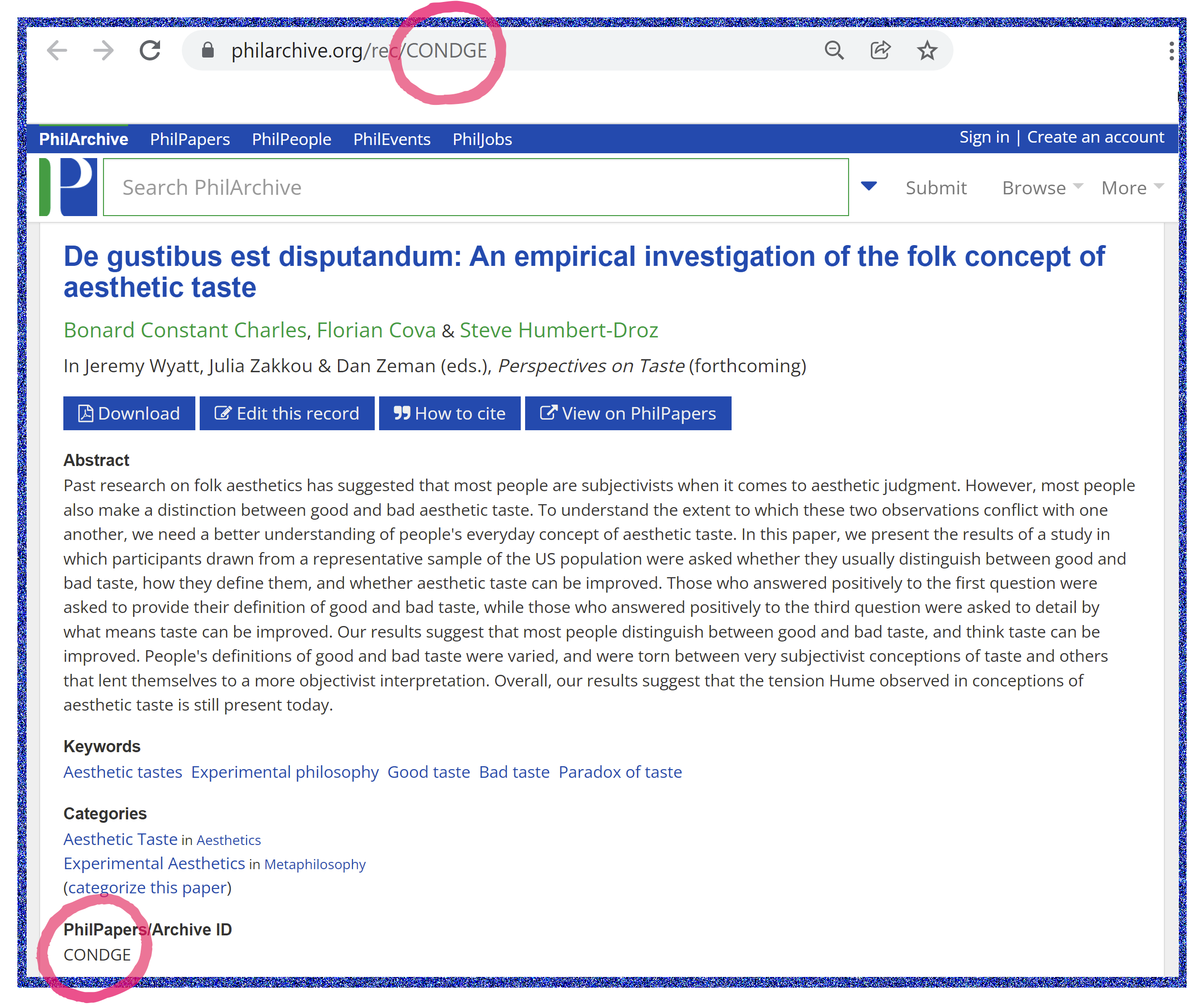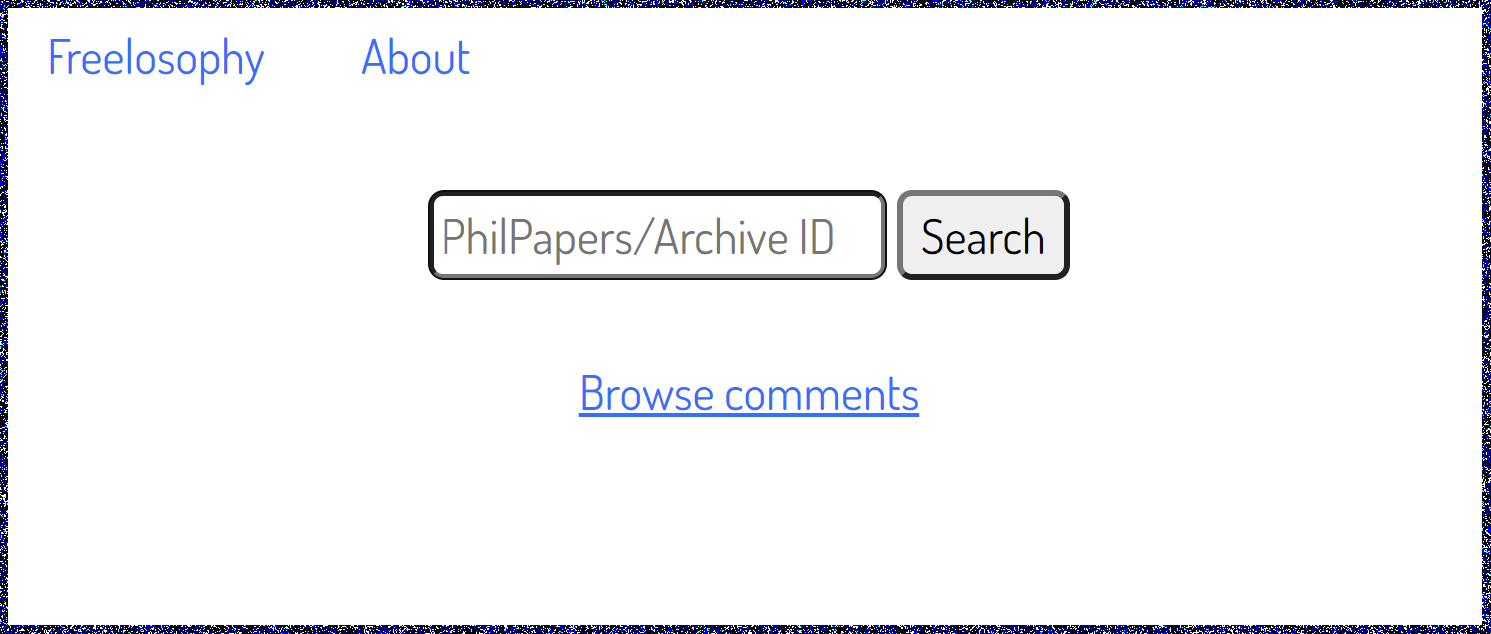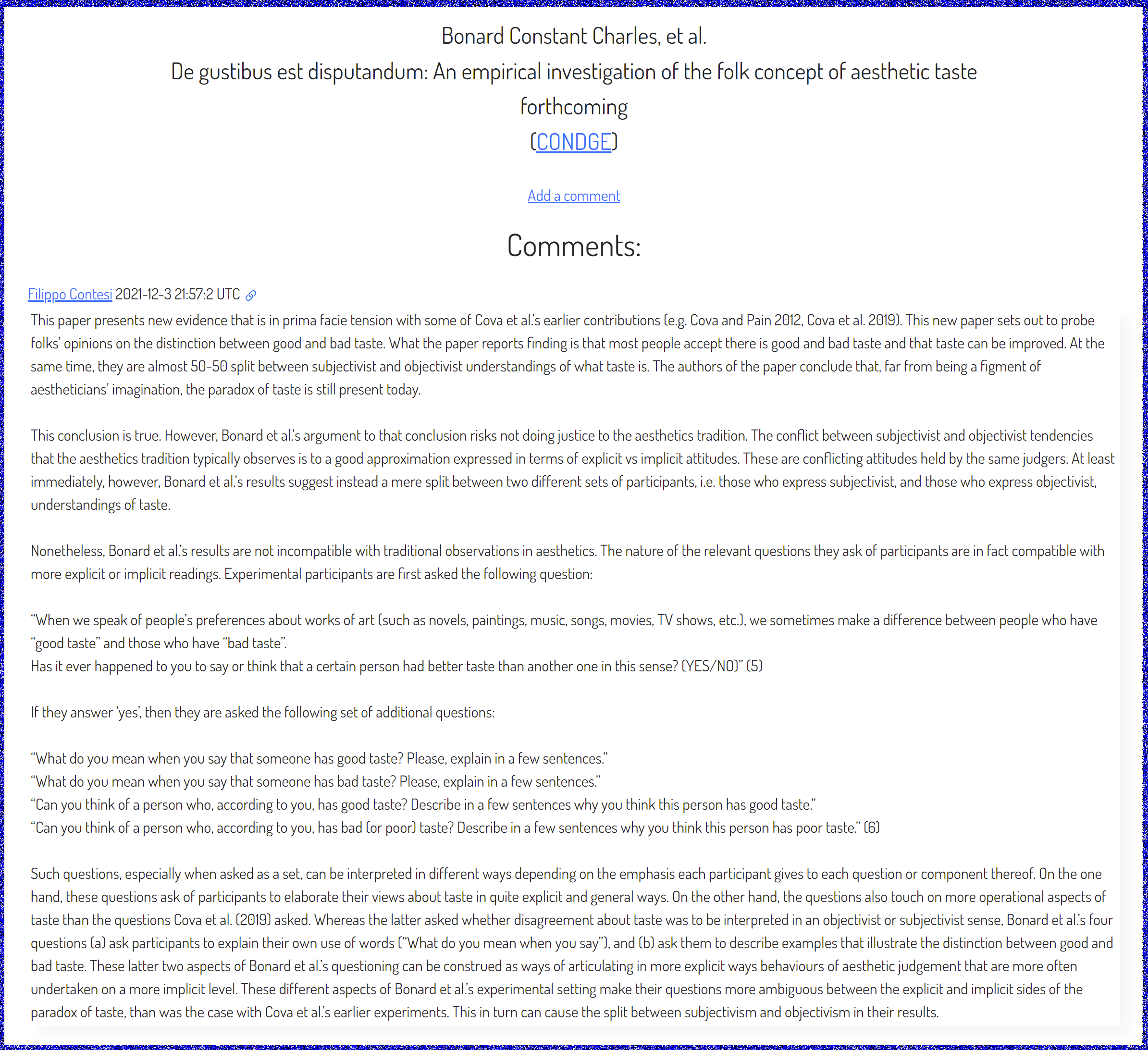New Site for Publicly Commenting on Philosophy Papers
A pair of philosophers have developed what they call “the first centralized forum for discussion of all papers uploaded on PhilArchive and PhilPapers.”
“Freelosophy” is a new site that allows visitors to look up papers by their PhilPapers or PhilArchive ID, leave a comment about them, and read the comments left by others. It was created by Filippo Contesi and Giulio Pietroiusti (University of Barcelona), who write in:
In some academic disciplines, publication and discussion of articles before journal submission is generally much more widespread than in philosophy. Indeed, most journal publishing houses are publicly committed to considering pre-archived papers for publication. You can double-check this for your journal of choice here. Philosophers already can make their pre-prints publicly available at any point on at least one pre-print repository: PhilArchive.org. However, currently existing web platforms for public discussion of scientific pre-prints (e.g. PubPeer.org) cannot be used to discuss PhilArchive-d papers. So, we have created a website that allows anyone to comment freely on papers present on PhilArchive and/or PhilPapers.
How does it work? Suppose you are over at PhilArchive, checking out an article like this one:

You’ll see that, like every paper at PhilPapers and PhilArchive, this one has an ID. It appears in the web address for the article, and is also listed near the end of its PhilArchive entry.
Perhaps you’ve read the paper and want to leave a public comment, or are curious what others have had to say about it. If so, go over to Freelosophy and type the ID into the search bar and click “search.”

Any comments on that article will show up, along with an “add a comment” link, like so:

Contesi and Pietroiusti say that they welcome feedback on the site. Freelosophy is brand new, so there aren’t a lot of paper comments there just yet. You can make it more useful by visiting it and trying it out yourself, here.



Great idea. But wouldn’t it be just simpler if Philpapers added this feature?
PhilPapers used to have discussion forums linked to each paper (I recall occasionally posting a link there when I blogged a response to a paper). I wonder why they discontinued that feature? (Perhaps insufficient uptake? If so, I hope this new venture is more successful!)
yes, our experience was that the discussion forums were rarely used, and tended to be dominated by nonphilosophers. we tried moderating for quality but that felt uncomfortably exclusionary and there just wasn’t all that much high-quality discussion left. if this new venture can avoid those outcomes, i’ll be impressed.
Two quick thoughts if philpapers is going to reconsider this feature at some point: (1) Given the integration with philpeople, maybe authors can moderate the comments on their own papers. That way the task will be decentralized and it’ll be much more mangable. (2) There can be filters on comments: e.g. only show comments from people with a philpeople profile or only people with philpeople profile that is associated with a university, or only grad students or faculty with profiles at philpeople, etc.
Thanks for your comments, all. (Hi, Richard, nice to hear from you!) My own interest in co-creating Freelosophy (thought I cannot speak for Giulio) is along the lines of what Daniel Weltman and Junior woman suggest on this page. So my own focus is on non-accepted, non-published PhilArchive papers. It is there that public discussion is most useful, in my personal view. As philosophers, we can do much to improve the research publication process in ways that are more open, faster and more transparent. And we can learn a lot from disciplines like e.g. physics in these respects. I have no objections to Phil* including comments on their platform, but, as I understand from David here and from previous private correspondence with him, Phil* does not seem interested at the moment in doing that. So I thought I would help by building something separate. I have no idea whether and how fast this will change philosophy for the better, but one hope I have is that the idea of pre-publication on “archives” seems now more widespread than it was when the Phil* discussion forums were up. For one thing, I would guess that those forums were up largely before even the very creation of PhilArchive, so they presumably were devoted to commenting already accepted or published papers. At the same time, Phil* might do things on their end to help Freelosophy move in the direction I envisaged. Some of these I have suggested to David and his team over the years, and some were implemented. Right now, e.g., it would be most useful to be able to easily see/filter recent additions on PA that are neither published nor accepted for publication (I believe PA categorizes those as “manuscripts”). As to anonymous commenting and commenting by non-philosophers, I am personally in favour of both, partly for the reasons “Tela Naski” suggests below, and also because again I would like philosophy to move towards a more open and transparent publication process (and also because I think philosophy is an academic discipline where “public participation” is most important).
Why does anonymous commenting make philosophy more transparent and open? Do you have empirical evidence that anonymity reliably leads to more openness/transparency in disciplines (whatever this means)? And why do you think these outweigh the problematic effects of anonymous commenting?
This looks like a great initiative, though I have one worry. If anonymous posts are allowed, it would be very easy for someone to create a “Sock Puppet” account and to then comment negatively on the papers of one’s rivals. For example, one might create a sock puppet, go to the rival’s paper, and say “This paper is obviously poorly argued” and then create *another* sock puppet and go to the same paper, and add “Yes, I agree, badly argued and uninteresting conclusion.” Iterating this process could create what is called an “appearance of consensus” that the paper is bad. (I would not want this to happen to me, or to my friends.) Thus, I suggest, comments must be made by official accounts linked to university addresses and ORCID ids that are made publicly visible.
Pubpeer seems to be a well established analogous service used by scientists. They allow anonymous comments. They say:
They also say that, in moderating comments, will consider the following issue:
This seems to solve the problem you raise without sacrifice the possibility of commenting anonymously.
This is an excellent first step towards something like a philosophical arXiv. As the quote above mentions, in some other disciplines this is the norm, and I think it would be better than our present circumstances if philosophy were like these other disciplines. (I believe Marcus Arvan has often said similar things over at The Philosopher’s Cocoon). We have PhilPapers and PhilArchive to thank for laying a lot of the groundwork, so, kudos to those tremendous sites, as usual.
Before I start commenting willy nilly I’d love to hear from people with some experience of how other disciplines do this sort of thing. That’s not to say we need to copy them, but presumably they’ve had experience with this that we can perhaps learn from.
As someone who recently decided that conferences (or at least intercontinental conferences, which for me is pretty much all conferences) are off the table because of environmental concerns, my ideal philosophical future is one in which discussion of works in progress takes place on a site like Freelosophy, where there is an open record that everyone can add to, rather than in conferences. So the ideal use case I am picturing is one where lots of people are commenting on lots of things. But, since this is all quite new to me, maybe my vision has downsides I’m not aware of, and there are better modes of engagement. Any thoughts?
I think the design of the site depends on what they take the purpose of the comments function to be. In the sciences, pre-publication has a number of purposes, including, it seems to me, (1) constructive criticism; (2) availability of the ideas to the field more quickly, allowing others to build on, and respond to, the work sooner than they otherwise would have been able to (though Philpapers already allows this to some degree); (3) constructive dialogue between the author and those engaged in (1) and (2). If the philosophy version has similar goals, then I think only allowing user-verified, non-anonymous comments is the way to go. I think an anonymous forum will end up being populated with comments of hopelessly poor quality and are unlikely to be constructive to the authors or the profession more broadly.
I appreciate the work that has been put into this, and I realize that the intentions and ideas behind it are great, but the existence of this new platform is honestly absolutely terrifying to me. As is, I think the designers were negligent in a couple of ways, and the platform would need some overhaul. First, as others mentioned, it’s absolutely terrifying to think that there’s a public, centralized platform on which any paper on Philpapers is subject to *possibly anonymous!!* commentary. This just seems like a perfect recipe for all sorts of toxic, highly problematic behaviors. It is true that there are many venues in other disciplines with similar platforms, but in these cases, people *intentionally and consensually* upload their papers in order to seek comments. In the current case, papers on Philpapers are made available for commenting on a centralized platform without the consent of the authors (actually, aren’t there any legal problems associated with this?). I also realize that people comment on others’ work all the time–either in professional venues (say, journals) or in other social media platforms. In the former, however, they do this with their name attached to it. And in the latter case, they might do it anonymously, but it doesn’t happen on a *centralized* platform, which arguably leads to a different range of reliable effects.
I think this is a great idea.
One worry I always have about uploading pre-accepted papers anywhere is how that would affect the review process. As far as I know, in physics, there is no blind review (at least, the author’s identity is known to the reviewers). Is philosophy also moving towards that paradigm? My particular subfield is really small so there it is rarely completely blind already. But sometimes it still is.
Thanks, postdoc. Good question. On the one hand, as we say in our announcement, journal publishing houses are in large part legally/publicly committed to considering pre-archived papers. So are, as far as I can tell, most if not all individual philosophy journals published by those publishing houses. Again, as we say, you can check on the Sherpa Romeo database. However, this is (with the exception AFAIK of philosophy of science journals) in my anecdotal experience not always recognized or known by philosophy journal editors, who continue to be at least in principle committed to double- or triple- anonymity. (Which might not necessarily mean that in individual cases these journals would refuse to consider a PhilArchive-d paper simply because the identity of the authors is revealed on PA.) Now, there are, in my view, technical ways to combine an arXiv culture with journal-review anonymity. These ways, however, would require further investment in infrastructure. I believe philosophy should decide ASAP either that it wants to be committed to anonymity and adopt these technical ways, or embrace the physics etc. model that you correctly characterize.
Sorry to be a bit late to this discussion. As a sometime applied epistemologist, I’ve been thinking for quite some time that an initiative like this could be helpful to our discipline, having followed PubPeer with considerable interest.
PubPeer was created in reaction to perceptions that current systems of pre-publication peer-review were staggering under growing pressure from scientific fraud, particularly in the biomedical sciences. Although I understand very well Another Junior Woman’s fears, PubPeer’s anonymity is crucial to its effectiveness, given the potential for retaliation by senior bad actors against vulnerable early career reporters:
https://www.wired.com/2014/12/pubpeer-fights-for-anonymity/
It’s been interesting to see how the site has taken off. Many shocking past abuses of data and images have come to light, with commenters developing and sharing new techniques for spotting them ‘on the fly’. The site’s anonymity was materially tested when it was sued by Fazlul Sarkar, a cancer researcher who had a lucrative senior job offer rescinded after anonymous comments on PubPeer suggested he had been engaging in scientific fraud. Sarkar alleged “defamation” – interestingly, he lost. (He has since had a significant quantity of publications retracted.)
So the interesting questions for us philosophers concern our differences and similarities to the natural sciences. Are we similarly vulnerable to research that is ‘unethical’ (however one chooses to define that) passing pre-publication peer review? Could there be other virtues in opening up public ‘review’ spaces over and above what already exists in just writing another piece in response?
I had a look at the site. Ease of use is key if this kind of crowdsourcing is to reach critical mass. As others have already commented, I think if it could be integrated with other tools philosophers use frequently, that would be really helpful. E.g. PubPeer now has a browser plug-in which alerts me if any papers in Google Scholar searches have comments.
I would love to see this project develop further. Thanks for the work you’ve put in, Filippo and Giulio.
I am glad that this sort of attempts are emerging as part of the general trend, and hope something like this can really take off. I am often bothered by the technical mistakes found in (influential) articles and books but which I have no intention to write papers or discussion notes on. Platforms like this is one of those ideal places to post such comments and have mini-discussions about them. So I see huge potentials for this.